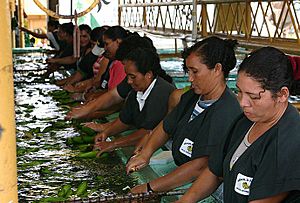Union of Banana Exporting Countries facts for kids
The Union of Banana Exporting Countries (Spanish: Unión de Países Exportadores de Banano or UPEB) was a group of countries in Central and South America that exported bananas. It was formed in 1974. Their main goal was to get a fairer price for their bananas from big American companies. These companies controlled most of the banana trade in North America. UPEB wanted to add a small tax on each box of bananas sold. However, this plan faced problems when one of the US companies paid bribes to officials in Honduras and Italy. When these bribes became public, the UPEB group fell apart. This event, known as the Bananagate scandal, led to the creation of a new law in the United States in 1977, called the Foreign Corrupt Practices Act. This law made it illegal for US companies to bribe foreign officials.
How UPEB Started
In 1974, several countries decided to work together. These included Colombia, Costa Rica, Ecuador, Guatemala, Honduras, Nicaragua, and Panama. They wanted to form a group to control banana exports to North America. The Philippines was a major banana exporter but did not join this group. At that time, bananas sent to Europe came mostly from former French and British colonies in the Caribbean.
For 20 years, banana prices had not increased much. A study by the United Nations found that banana-producing countries received very little money. Only about 17 cents of every dollar spent on bananas in North America went to the countries that grew them. Just three large US companies controlled most of the banana trade. These companies were United Brands Company, Standard Fruit, and the Del Monte Corporation.
UPEB suggested adding a tax of one dollar on every 40-pound box of bananas exported. The banana companies did not like this idea. They even threatened to stop their operations in these countries. There were also too many bananas on the world market. Ecuador, which was the biggest banana producer, refused to put the tax in place.
The former President of Costa Rica, José Figueres, said that if the companies refused to pay the tax, their properties should be taken over by the government. Standard Fruit then warned the new president, Daniel Oduber, that they would leave Costa Rica if there were more threats. Because of this, Costa Rica lowered its tax demand to 25 cents per crate.
The Bananagate Scandal
In 1974, Honduras passed a law to increase its tax on banana exports. The tax went from 25 cents to 50 cents for each 40-pound box. Honduras was a very important supplier for United Brands Company, providing over 22% of their bananas that year.
In 1975, Eli M. Black, who was the head of the United Brands Company, died. When the Securities and Exchange Commission (SEC) looked into his death, they found a big secret. This secret became known as "Bananagate." United Brands had paid a large bribe of $1.25 million to the Honduran President, Oswaldo López Arellano. Another $1.25 million was paid the next year. This money was put into a bank account in Switzerland. The Honduran Minister of the Economy, Abraham Bennaton Ramos, helped manage this payment.
After the bribe, the Honduran tax on bananas was lowered from 50 cents to 25 cents per box. This change saved United Brands Company about $7.5 million in tax payments. The discovery of this bribe caused the UPEB group to break apart. It was also found that United Brands Company had paid another $750,000 in bribes to an Italian official. This was to prevent limits on their banana exports to Italy, starting in 1970. The SEC found that Eli Black knew about and approved all these bribes. At that time, it was not illegal for US companies to bribe foreign officials. However, it was illegal for companies to hide such payments from their owners (stockholders).
United Brands Company also admitted that they tried to keep the bribes a secret from the SEC. They argued that telling the public would harm the company and its owners. The company's lawyers even asked the U.S. State Department to help. They said that news of the Honduran bribe could hurt the relationship between the US and Honduras. But the State Department refused to get involved.
When the bribe was revealed, it caused the military government in Honduras to be overthrown. This also led to the Honduran government taking over United Brands' railways. The company also had to give up a lot of its land.
What Happened Next
On May 1, 1975, Costa Rica passed a new law. It raised the tax on banana exports from 25 cents to $1 per 40-pound box. The law stated that 45 cents of each tax dollar would go to the government. The other 55 cents would help independent banana growers. United Brands' local company in Costa Rica then sued the government in April 1975. They asked for $3 million. They said the new tax went against an agreement that the government would not tax the company until 1988.
Since it was formed, the Union of Banana Exporting Countries has mostly been limited to charging a small tax on banana exports from companies.
See also
 | Toni Morrison |
 | Barack Obama |
 | Martin Luther King Jr. |
 | Ralph Bunche |


